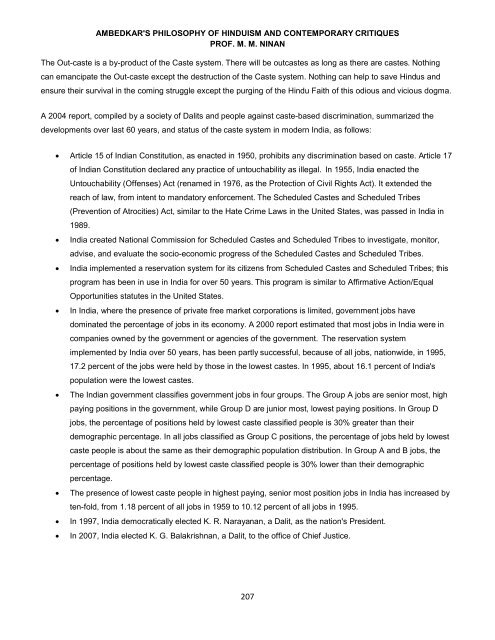Ambedkar-Philosophy of Hinduism
Create successful ePaper yourself
Turn your PDF publications into a flip-book with our unique Google optimized e-Paper software.
AMBEDKAR'S PHILOSOPHY OF HINDUISM AND CONTEMPORARY CRITIQUES<br />
PROF. M. M. NINAN<br />
The Out-caste is a by-product <strong>of</strong> the Caste system. There will be outcastes as long as there are castes. Nothing<br />
can emancipate the Out-caste except the destruction <strong>of</strong> the Caste system. Nothing can help to save Hindus and<br />
ensure their survival in the coming struggle except the purging <strong>of</strong> the Hindu Faith <strong>of</strong> this odious and vicious dogma.<br />
A 2004 report, compiled by a society <strong>of</strong> Dalits and people against caste-based discrimination, summarized the<br />
developments over last 60 years, and status <strong>of</strong> the caste system in modern India, as follows:<br />
• Article 15 <strong>of</strong> Indian Constitution, as enacted in 1950, prohibits any discrimination based on caste. Article 17<br />
<strong>of</strong> Indian Constitution declared any practice <strong>of</strong> untouchability as illegal. In 1955, India enacted the<br />
Untouchability (Offenses) Act (renamed in 1976, as the Protection <strong>of</strong> Civil Rights Act). It extended the<br />
reach <strong>of</strong> law, from intent to mandatory enforcement. The Scheduled Castes and Scheduled Tribes<br />
(Prevention <strong>of</strong> Atrocities) Act, similar to the Hate Crime Laws in the United States, was passed in India in<br />
1989.<br />
• India created National Commission for Scheduled Castes and Scheduled Tribes to investigate, monitor,<br />
advise, and evaluate the socio-economic progress <strong>of</strong> the Scheduled Castes and Scheduled Tribes.<br />
• India implemented a reservation system for its citizens from Scheduled Castes and Scheduled Tribes; this<br />
program has been in use in India for over 50 years. This program is similar to Affirmative Action/Equal<br />
Opportunities statutes in the United States.<br />
• In India, where the presence <strong>of</strong> private free market corporations is limited, government jobs have<br />
dominated the percentage <strong>of</strong> jobs in its economy. A 2000 report estimated that most jobs in India were in<br />
companies owned by the government or agencies <strong>of</strong> the government. The reservation system<br />
implemented by India over 50 years, has been partly successful, because <strong>of</strong> all jobs, nationwide, in 1995,<br />
17.2 percent <strong>of</strong> the jobs were held by those in the lowest castes. In 1995, about 16.1 percent <strong>of</strong> India's<br />
population were the lowest castes.<br />
• The Indian government classifies government jobs in four groups. The Group A jobs are senior most, high<br />
paying positions in the government, while Group D are junior most, lowest paying positions. In Group D<br />
jobs, the percentage <strong>of</strong> positions held by lowest caste classified people is 30% greater than their<br />
demographic percentage. In all jobs classified as Group C positions, the percentage <strong>of</strong> jobs held by lowest<br />
caste people is about the same as their demographic population distribution. In Group A and B jobs, the<br />
percentage <strong>of</strong> positions held by lowest caste classified people is 30% lower than their demographic<br />
percentage.<br />
• The presence <strong>of</strong> lowest caste people in highest paying, senior most position jobs in India has increased by<br />
ten-fold, from 1.18 percent <strong>of</strong> all jobs in 1959 to 10.12 percent <strong>of</strong> all jobs in 1995.<br />
• In 1997, India democratically elected K. R. Narayanan, a Dalit, as the nation's President.<br />
• In 2007, India elected K. G. Balakrishnan, a Dalit, to the <strong>of</strong>fice <strong>of</strong> Chief Justice.<br />
207


















